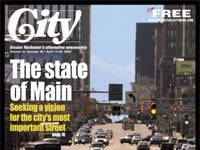[
{
"name": "500x250 Ad",
"insertPoint": "5",
"component": "15667920",
"parentWrapperClass": "",
"requiredCountToDisplay": "1"
}
]
The US Senate has been known as a "millionaires' club" for years. So many years, in fact, that the nickname needs a "multi" or "centi" to stay current.
When ABC news listed "America's 10 richest politicians" last year, four were US senators: Jon Corzine (NJ), John Kerry (MA), Herb Kohl (WI), and Jay Rockefeller (WV), collectively worth $1.3 billion. They're all Democrats, by the way. But some perspective: Our own Tom Golisano, also on the list, has practically that much all by his lonesome. And New York Mayor Mike Bloomberg, with $4.8 billion, can buy and sell the whole bunch.
You may be thinking This is about envy, or So what else is new? or That kind of wealth is obscene. Sign me up for numbers two and three.
But I'm raising the gazillionaire issue not to bash, but to praise. Selectively.
Some of the richest guys around are sounding pretty good lately. And as the Reagan-Bush revolution rolls along, they're weirdly becoming marginal.
Start with those rich senators. Kerry, Corzine, Kohl, and Rockefeller voted against the Senate's $350 billion tax-cut bill last week. "Voted against" is different from "fighting it to the death," of course, but the senators earned at least partial credit in the class war. (Jay Rockefeller recently told AARP that the tax on stock dividends should be preserved to fund prescription-drug coverage.)
But on this question, no senator sounds quite like Charlie Munger of Berkshire Hathaway, a top holding company. With $1.3 billion in his pocket, Munger made the "Forbes 400" list of the wealthiest Americans. But he's got a little heart, too.
What's on Munger's mind? At the firm's annual meeting a few weeks ago, he commented on George W. Bush's compulsion to end the taxation of dividends --- indeed, this is a key part of the Bush package.
"I don't think you can make it so unfair that a man living entirely on dividends will pay zero tax while a cab driver has to work 16 hours a day to barely feed a family," Munger said. "I just don't think it works in a democracy."
Munger cut neatly through the slop. Yet his maximum boss, famed investor Warren Buffett, outdoes him.
Here's Buffett at the same annual meeting: "Currently, I'm paying about the same percentage of my income to the government as my secretary does," he said. Buffett famously takes just $100,000 per year in salary; his wealth is in securities.
"I pay a higher income tax rate," said Buffett, "but she pays higher Social Security taxes as a percentage of her income... At Berkshire, if we declared a $1 billion dividend and it were tax-free, I might be paying one-tenth of the rate of my income as she would be." Then there's efficacy: "The big benefits of taxes will go to people like me and Charlie, and that's not going to stimulate the economy, it will stimulate us."
Buffett puts more than his mouth where his money is. He's been active with a project called Responsible Wealth, along with Bill Gates Sr. and other notables. The project is coordinated by Chuck Collins and Felice Yeskel, co-directors of United for a Fair Economy, a Boston-based group. Collins and Yeskel co-authored Economic Apartheid in America and have toured widely to spread the book's message.
For you convergence fans: Collins, an Oscar Mayer heir, gave away his half-million-dollar inheritance years ago. Senator John Kerry married into the Heinz family and is now valued at a half-billion.
There's something especially strange about Bush's dividend-tax attack. It's clear that cutting this tax will benefit the rich overwhelmingly. But the theory behind the cut --- that dividends are "taxed twice" --- also smells funny.
The theory usually goes unchallenged. When, for example, the New York Times reported May 16 on the Senate's passage of a $350 billion cut, the article referred to "high-minded" Republican goal of "end[ing] the double taxation of dividends."
Here's a reality check: A corporation and a shareholder are legally distinct and separate entities; each must pay tax on income received, period. This legal separation is vital: If you owned a few shares of Enron, would you want to be held liable for that company's crimes?
The country needs to focus on this. But there's another, very real duality we should be addressing: how US tax policy takes from the poor (cities) and gives to the rich (war industries).
As our upper classes are repealing taxes on their unearned income, the nation is becoming more and more a warrior state. And this isn't happening on Mars. You can see it every day in the city of Rochester, which is coming apart at the seams --- a fact not disguised by full clubs downtown, or glossy construction plans from Potemkin Facades Ltd.
The Massachusetts-based National Priorities Project (www.nationalpriorities.org) has gathered data that illuminate the problem. First, on the state level: According to the project, the tax cuts will give the vast majority of New Yorkers even less than you'd expect. Using an assumption that federal tax cuts will total $1.85 trillion over the next decade, the project figures the bottom 50 percent of New York residents will get between $0 and $100 in 2003. Those in the middle 20 percent will get $261 on average. The top one percent will get more than $48,000.
Yes, Bush's love for the rich could make Louis XIV blush. But the cities are Bush's special victims.
Consider the city of Rochester. Economist Anita Dancs (pronounced dahnch), the National Priorities Project's research director, ran the local numbers for me. The median income household in the city, she determined, using US census figures, paid $557 in federal individual income taxes in 2002. (The statewide median household paid $3,251 that year. Why the divergence? Because of the harshness of urban poverty, and the benefit of Earned Income Tax Credit. For another reality check, compare Buffalo at $350 and Syracuse at $328.) So our urban populations don't have much to gain from income-tax cuts.
But the spending side also hurts the cities big time. Our federal tax money isn't primarily funding jobs, health care, and schools. No, the priorities are upside down. Our tax money builds a bigger and stronger warrior state. And no one in power, least of all on the local level, is talking about this.
The National Priorities Project, though, has tracked where our money is going. Here's how the Rochester median household's $557 tax payment was divvied up: $146 for "military and defense" (including "homeland security" and the Andean counterdrug initiative, etc.); $33 for military-related debt; and $19 veterans' benefits (necessary and good, but regrettable). That's $198 of the $557 total.
Federal health expenditures, by comparison, accounted for $106 of the $557. Federal education accounted for just $18, and housing, less than $9.
What about job training in a time of rampant unemployment, especially among urban populations, always the first cut down in a recession (and war)?
Don't make me cry. Of that $557, job training got two bucks and change. Welcome to Rochester, a 1998 "All-America City." Only a short hop from Buffalo (AAC, 2002) and bleaker times.
Speaking of Tax Cuts
Latest in Columns
More by Jack Bradigan Spula
-

The state of Main
Apr 14, 2004 -
School improvement: the price is wrought
Apr 7, 2004 -
Hour of power
Mar 31, 2004 - More »





